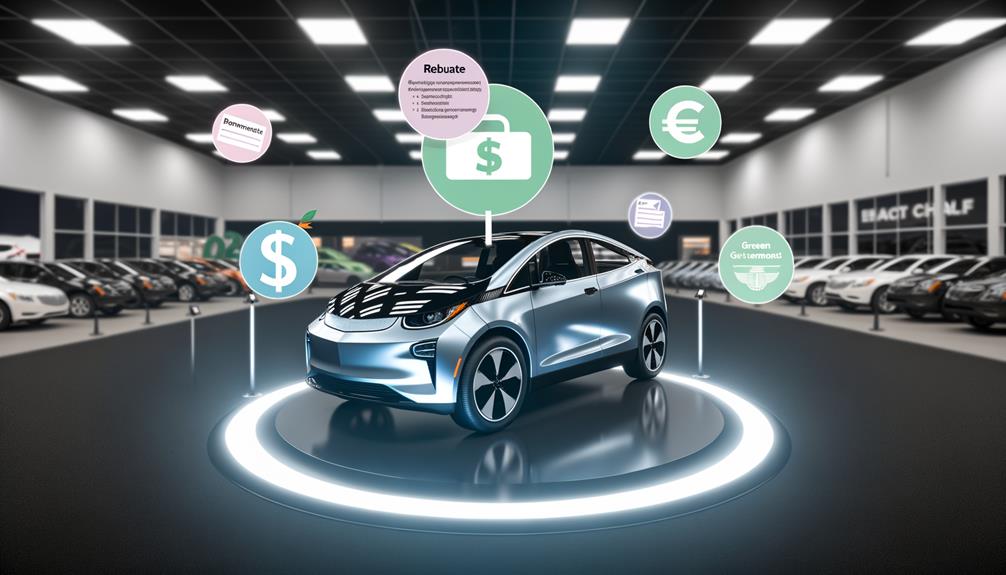When you're looking for the cheapest electric car, the Chevrolet Bolt EV is hard to overlook. Priced at $27,495, it offers an impressive range of around 259 miles, making it suitable for both daily commutes and longer trips. Plus, with federal tax credits, its cost can drop below $20,000, making it a highly attractive option for budget-conscious buyers. But is the Bolt EV the best choice for you? Before you decide, let's compare it to other affordable EVs and explore what features truly matter when you're on a budget.
Contents
Top Budget-Friendly EVs
When it comes to the top budget-friendly EVs, several models stand out for their affordability and impressive features. If you're looking for one of the cheapest electric cars, the 2023 Chevrolet Bolt EV is a strong contender, with a starting price of $27,495. This vehicle offers a spacious interior and an impressive range of approximately 259 miles, making it a practical choice for both city and highway driving. You might also be eligible for a federal tax credit, further lowering the cost.
Another option is the 2024 Nissan Leaf S, which begins at $28,140. Known for its reliable performance, this model offers an EPA-estimated range of 149 miles. While it doesn't provide the same range as the Bolt EV, it's still a solid choice if you're seeking a dependable, budget-friendly EV.
For those who prefer a bit of style, the 2023 Mini Cooper Electric SE is worth considering. Priced at $31,895, it features a chic design and an EPA-estimated range of 114 miles. Its compact size and range make it particularly suitable for urban environments.
The 2024 Hyundai Kona Electric SE, starting at $34,050, offers a range of 200 miles and comes equipped with advanced tech features. Its spacious cargo area also makes it a versatile option for various needs.
Lastly, the 2023 Volkswagen ID.4, priced around $38,000, is a family-friendly SUV with a spacious interior and an EPA-estimated range of 250 miles. Its combination of space and range makes it a compelling choice for families looking to shift to electric driving without breaking the bank.
Key Features to Compare
As you evaluate the key features to compare among the most budget-friendly EVs, it's essential to focus on aspects that directly impact your driving experience and overall value. One of the foremost considerations is the price. The 2023 Chevrolet Bolt EV stands out as the cheapest electric car at $27,495. However, price alone doesn't capture the full picture.
Range is another vital factor. The Chevrolet Bolt EV offers an impressive range of approximately 259 miles, making it a strong contender if you need a vehicle for both urban and longer commutes. In contrast, the Nissan Leaf, priced at $28,000, provides a more modest EPA-estimated range of 149 miles, which might suffice for city driving but could be limiting for longer trips. The Mini Cooper Electric SE, at $31,895, offers the shortest range of 114 miles, making it ideal for urban settings but less versatile overall. The Hyundai Kona Electric SE, starting at $34,050, strikes a balance with a 200-mile range and larger cargo capacity, appealing to those needing extra space.
Federal and state incentives can greatly impact the affordability of these vehicles. For instance, the Chevrolet Bolt EV qualifies for the full $7,500 federal EV tax credit, considerably lowering its effective price and enhancing its value proposition. When comparing features, it's also wise to look at the availability of such incentives for models like the Nissan Leaf and Hyundai Kona Electric, as these can make a notable difference in your final decision.
Pros and Cons of Affordable EVs

When considering affordable EVs, you'll need to weigh the range and performance limitations, especially if you plan on long-distance travel. It's also essential to think about the availability of charging infrastructure in your area, as some models may take longer to charge due to older battery technology. On the plus side, these budget-friendly options often come with incentives like federal tax credits, making them a financially viable choice despite fewer premium features.
Range and Performance
Considering the range and performance of affordable electric vehicles (EVs), you'll find a mix of pros and cons that cater to different needs and lifestyles. Among the cheapest new all-electric cars, the 2023 Chevrolet Bolt EV stands out with an EPA-rated range of 259 miles, offering a significant range boost for standard-range EVs, making it ideal for urban and suburban driving. Similarly, the 2023 Volkswagen ID.4 provides an impressive 250 miles, making it a great option for families seeking electric SUVs without breaking the bank.
However, not all affordable electric vehicles offer such extensive ranges. The 2024 Hyundai Kona Electric SE, although priced from $34,050, delivers a competitive 200 miles and features a spacious interior and advanced tech, balancing affordability with practicality. Conversely, the Nissan Leaf S, with a starting price of $28,140, offers only 149 miles, which might be limiting for longer commutes, highlighting the trade-off between cost and range.
For strictly urban driving, the Mini Cooper Electric SE offers agility with its 114-mile range, but may not suit longer journeys. Tax credits can help offset costs, making these affordable EVs more accessible despite their varying ranges.
Charging Infrastructure Access
While range and performance are key factors when choosing an affordable electric vehicle (EV), charging infrastructure access plays an equally important role. Affordable EVs often face challenges with limited charging infrastructure, especially in rural areas, making long-distance travel less convenient. However, many budget-friendly options like the Chevrolet Bolt EV are compatible with an expanding network of public charging stations, including DC fast charging stations, which can quickly recharge your vehicle.
| Charging Option | Pros | Cons |
|---|---|---|
| Public Charging | Fast and expanding network | Limited availability in rural areas |
| Home Charging | Convenient overnight charging | Requires installation and initial investment |
| Fast Charging | Quick recharging times for daily commuting | May not be available in all locations |
Home charging stations offer significant convenience, allowing you to plug in overnight and start each day with a full battery, reducing dependence on public charging infrastructure. Federal incentives can lower the costs of installing home charging stations, making it more affordable for EV owners.
As charging infrastructure grows, the increasing number of fast charging stations in urban areas enhances the practicality of owning an affordable EV for daily commuting. Overall, understanding the pros and cons of charging infrastructure access can help you make a more informed decision when selecting an affordable EV.
Cost and Incentives
The price tag of an electric vehicle (EV) is a critical factor for many buyers, and affordable models like the 2023 Chevrolet Bolt EV, starting at $27,495, are increasingly appealing, especially with the added benefit of a $7,500 federal EV tax credit. This makes the Bolt EV one of the cheapest standard-range EVs on the market, effectively lowering its purchase price to under $20,000.
Affordable electric vehicles also benefit from various state incentives such as rebates and additional tax credits, which can further reduce the initial cost. However, it is crucial to take into account that these budget-friendly options, like the Nissan Leaf and Mini Cooper SE, typically offer fewer miles per charge compared to more expensive models. This limited range might affect their suitability for longer trips.
While the lower entry price is attractive, you might find that these low-cost EVs come with fewer advanced features and technologies. This trade-off is something to evaluate carefully. On the upside, the overall cost of ownership for affordable electric vehicles tends to be lower than that of traditional gasoline cars. You'll enjoy reduced maintenance costs and significant fuel savings, making these new EVs appealing for budget-conscious consumers looking for economical transportation options.
Charging Infrastructure and Costs
Installing a home charging station is a critical consideration for electric vehicle owners, with costs ranging from $500 to $2,000 depending on the complexity of installation and any necessary electrical upgrades. A Level 2 home charging station can greatly reduce your daily charging time compared to a standard wall outlet. However, those initial costs can vary widely based on your home's electrical setup.
Public charging networks are expanding rapidly, providing more convenience for electric vehicle (EV) owners. These networks include DC fast chargers, which can deliver 100-350 kW, allowing you to charge up to 80% in about 30 minutes. This can be a game-changer for long-distance travel and mitigating range anxiety.
One of the best ways to manage your charging costs is to take advantage of off-peak electricity rates. These rates can be as low as $0.05 per kWh, compared to peak rates that can exceed $0.20 per kWh. EV owners can schedule their charging during off-peak hours to save considerably on energy bills.
When considering the charging infrastructure, keep in mind:
- Public Charging Networks: Thousands of fast chargers are available across the U.S., reducing downtime during long trips.
- Charging Costs: Off-peak electricity rates and some public stations offering free charging can help you save money.
- DC Fast Chargers: Essential for reducing range anxiety by providing rapid charging during long travels.
Public charging stations may charge fees, typically ranging from $0.25 to $0.75 per kWh, depending on the network and location. Balancing home and public charging options can optimize both convenience and cost for EV owners.
Government Incentives and Rebates

When considering the cheapest electric car, you shouldn't overlook government incentives and rebates that can dramatically reduce the cost. Federal tax credits can knock off up to $7,500 from the purchase price, with many affordable models like the Chevrolet Bolt EV and Nissan Leaf qualifying. Additionally, various state and local incentives, which may include grants, tax credits, or reduced registration fees, can further decrease your expenses, so it's essential to check what's available in your area.
Federal Tax Credits
Purchasing an electric car can be made considerably more affordable thanks to federal tax credits, which can offer up to $7,500 in savings. The federal tax credit is a substantial incentive, but eligibility depends on several factors. Vehicles must meet specific price criteria: SUVs, vans, and trucks priced above $55,000 and other vehicles priced above $80,000 do not qualify. Additionally, the vehicle's battery capacity and where it is assembled play essential roles in determining eligibility.
To benefit fully from the federal tax credit, here are a few key points you should consider:
- Eligible vehicles: Confirm the car meets price limits and battery capacity requirements.
- Critical minerals: Recent changes mandate specific sourcing criteria for battery components.
- Tax liability: The credit applies to your federal tax liability, so you need to owe taxes to take full advantage.
State and Local Incentives
Many states' incentive programs can make buying an electric vehicle (EV) an even more attractive option by offering additional rebates and incentives. These state and local incentives can considerably reduce the overall cost, sometimes providing savings of up to $5,000 or more, depending on the state and vehicle model. In addition to state incentives, local programs may include tax credits, grants, and rebates, specifically designed to promote the adoption of electric vehicles.
Some municipalities even offer incentives for installing home charging stations, which can further enhance your savings. Income-based incentives in several states allow lower-income households to access larger rebates, making EV technology more accessible and equitable. When combined with federal tax credits, such as the $7,500 incentive for qualifying electric vehicles, you can achieve substantial savings off the MSRP of a new EV.
It's crucial to check the eligibility requirements and application processes for these state and local incentives, as they can vary widely. Be mindful of deadlines or funding limits to guarantee you get the maximum benefit. By leveraging these programs, you can make owning an electric vehicle more affordable and sustainable.
Future Trends in Affordable EVs
Anticipating future trends in affordable electric vehicles, the landscape is set to transform markedly with innovations and market dynamics. With the 2024 Chevrolet Equinox EV expected to start under $30,000 and offering over 300 miles of range, you're witnessing the dawn of a new era in affordable electric options. This model exemplifies how manufacturers are working hard to lower the price tag while enhancing performance and range.
The increasing competition among manufacturers is another significant factor. As more companies enter the market, prices are driven down, expanding consumer choices and making EVs under $50,000 more accessible. In 2023, the average price of new electric vehicles decreased by 10.8% to $55,353, thanks to a rise in supply and the introduction of budget-friendly models. This downward trend is expected to continue, broadening the reach of affordable electric vehicles.
Government incentives, like the $7,500 federal tax credit, play an essential role in making these vehicles even more appealing. These incentives reduce the effective price, making it easier for consumers to switch to electric without breaking the bank. Looking forward, nearly 60 configurations of electric vehicles are projected to be priced below $50,000, making EVs increasingly accessible to a broader audience.
Here's what you can expect in the near future:
- More budget-friendly models with enhanced features and longer ranges.
- Increased competition among manufacturers driving prices down.
- Expanded consumer choices as new models enter the market.
These trends suggest a more inclusive and dynamic market for affordable electric vehicles, making it an exciting time to contemplate making the switch to an EV.
Frequently Asked Questions
Which Electric Car Has the Lowest Price?
You're looking at the Dacia Spring Electric as the most affordable option, starting around $20,000. Among budget options, it leads current pricing trends. Consider electric vehicle incentives and long-term savings on charging costs for a thorough cost comparison.
Is Anyone Making a Cheap Electric Car?
You'll find affordable models like the 2024 Chevy Equinox EV and Dacia Spring Electric. With government incentives and advances in battery technology, manufacturer competition is rising to meet consumer demand, offering budget options and leasing benefits. Future predictions look promising.
Is an EV Cheaper Than Gas?
Yes, an EV's cheaper than a gas car when considering EV savings on charging costs, maintenance expenses, and fuel comparison. Tax incentives, high resale value, energy efficiency, and positive environmental impact make EVs a smart long-term investment.
What Is the Name of the Cheapest Electric Car?
You're looking for affordable models and budget options, right? The 2023 Chevrolet Bolt EV is the cheapest electric car. With EV incentives, including the $7,500 federal tax credit, it's a great choice for cost savings.
Conclusion
To sum up, if you're looking for a budget-friendly electric vehicle, the Chevrolet Bolt EV is currently the cheapest option, starting at $27,495. With a range of 259 miles and potential federal tax credits that can lower the price below $20,000, it offers great value. When evaluating affordable EVs, consider factors like charging infrastructure, government incentives, and future trends to make an informed decision. The Bolt EV's reliable performance and spacious interior make it a compelling choice.
